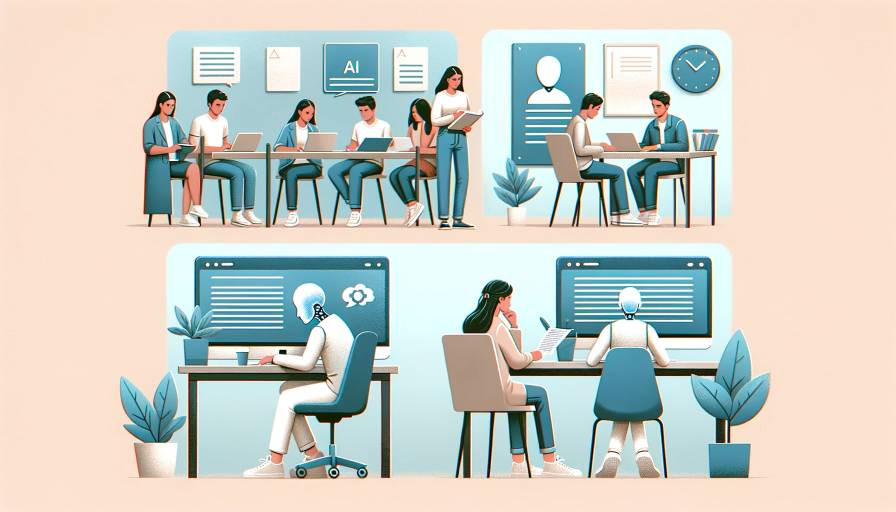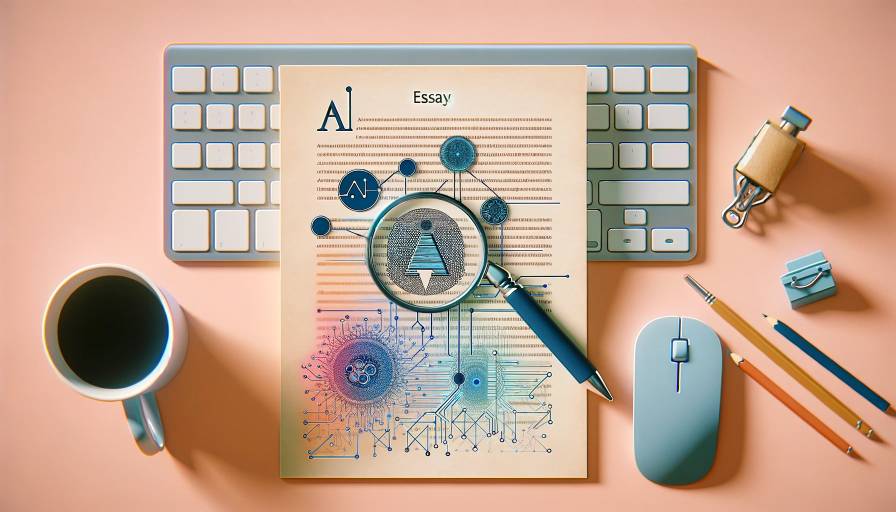In our rapidly evolving digital world, students increasingly turn to AI writing tools like ChatGPT for help with college admissions essays. This raises an important question: can colleges tell if you use AI assistance in crafting your application essay? With seasoned admissions officers well-versed in detecting AI-generated content, you might be surprised at how adeptly they can identify the nuances that distinguish human writing from AI-generated essays.
Technology continues to advance, making it even more paramount for students to maintain authenticity and fairness in the admissions process. To ensure you submit a compelling and genuine representation of yourself, it’s crucial to recognize the potential risks associated with relying on AI for your college essay. Join us as we explore the methods and tools admissions officers use to detect AI-generated essays and discuss the ethics and implications of leveraging AI writing assistance. Stay with us to learn more about navigating the evolving world of AI and its role in college admissions.
Navigating the Evolution of AI in College Admissions
AI writing assistants such as ChatGPT have significantly transformed the landscape of college admissions, providing students with ease in crafting essays while raising concerns about academic honesty. The rising capabilities of AI tools have prompted educators and admissions departments to adjust their teaching and detection methods. Comprehensive understanding by admissions officers, coupled with an evolving array of AI detection software, is part of modern scrutiny, aiming to ensure essays truly reflect applicants’ abilities.
As universities may adopt varied stances regarding AI usage, from outright prohibition to cautious endorsement for brainstorming, the equilibrium between leveraging technology and maintaining personal authenticity remains a pivotal discourse in the college admissions journey. In this section, we explore some key aspects of how AI is being used and detected in college applications and the ways universities are responding to this emerging trend.
“The balance between leveraging technology and maintaining personal authenticity is crucial in the context of college admissions.”
- The role of AI in the application process:While AI tools like ChatGPT can assist in generating ideas and refining drafts, they should not replace the original thoughts and efforts of students. College essays should reflect the true voice and character of applicants to present a genuine representation of their achievements and aspirations.
- Detection methods:Universities are increasingly leveraging AI detection software to scrutinize essays and identify inconsistencies that may indicate overreliance on AI tools. From advanced plagiarism checks and linguistic analysis to writing style evaluation, these sophisticated technologies help maintain the integrity of the college admissions process.
- University policies on AI usage:It is vital for students to be aware of and adhere to the AI policies of the institutions they target for admissions. Some universities may have strict policies against AI use in the application process, while others may accept limited AI involvement, such as brainstorming and making minor edits.
In the table below, we present a summary of these key aspects:
| Aspect | Description |
|---|---|
| AI’s Role in Applications | Idea generation, text refinement, and other supplementary aspects, but should not replace original student perspectives. |
| Detection Methods | AI detection software, linguistic analysis, advanced plagiarism checks, and writing style evaluation. |
| University Policies | Varied policies ranging from strict AI prohibition to cautious acceptance for brainstorming and minor edits. |
As the evolution of AI continues, it is crucial for students and educational institutions to maintain balance between embracing technology and preserving the authenticity of the college admissions process. Ensuring that essays showcase the genuine abilities and aspirations of applicants is of utmost importance in fostering a fair and equitable system for entry into higher education.

Detecting AI Use: The Tools and Tactics of Admissions Officers
Admissions officers employ a range of sophisticated AI detection tools and tactics to identify the use of AI-generated content in college essays. In this section, we will explore the various techniques and methods used by admissions officers when detecting AI assistance in applications.
Linguistic Analysis and Writing Style Evaluation
To determine if an essay was generated using AI, admissions officers use advanced linguistic analysis and writing style evaluation tools. These tools scrutinize the composition of sentences, word choices, and grammatical structures while searching for AI-specific patterns. One such pattern includes complex phrasing that lacks human nuances which are often an indicator of content generated by AI.
By comparing the writing style of an essay against an applicant’s past submissions, disparities can be detected, pointing toward possible AI aid. Such comparisons allow admissions officers to maintain a level playing field and uphold the integrity of the admissions process.
Advanced Plagiarism Checks: Beyond Traditional Methods
Essays now face advanced plagiarism detection measures that go beyond traditional methods. High-level plagiarism detection software cross-checks submissions against known AI-model outputs, such as the ones created by ChatGPT, as well as against previous students’ work. The goal is to ensure the originality and authenticity of college essays.
AI-generated essays now face advanced plagiarism detection measures that go further than traditional methods. These checks involve sophisticated algorithms that compare the essay against databases of existing AI outputs and previously submitted work.
This method marks a significant leap from conventional tools primarily designed for detecting direct copying from sources. Employing such advanced measures is integral to the integrity of the college admissions process, helping to maintain a level playing field and assess the applicants on their true merits.

The Ethical Implications of Using AI Writing Assistance
The increasing use of AI writing assistance in crafting college admissions essays raises crucial ethical concerns. These implications revolve around the authenticity of students’ self-presentation, academic integrity, and the potential inequality stemming from unequal access to AI technology. College admissions officers work tirelessly to evaluate each applicant’s potential and personal insights, yet the growing reliance on AI-generated essays may hinder their efforts to maintain a fair admissions process that reflects genuine effort and individual achievement.
AI and academic dishonesty go hand in hand when students rely on AI-generated content for their college admission essays. This dependence threatens the essence of the admissions narrative, where applicants are expected to showcase their true selves through honest and thoughtful writing. Academic integrity, a core value for any educational institution, includes not only refraining from plagiarism but also submitting work that is genuinely created by the applicant. In light of these concerns, stakeholders within the education sector must ensure AI tools are used responsibly to enhance and support human input without replacing it.
Academic integrity is pivotal to the college admissions process, as it ensures genuine representation and equal opportunities for all applicants.
Another pressing issue is the unequal access to AI technology among students. Not everyone can afford or easily access AI writing assistance, creating an imbalance of opportunities. This inequality may give privileged students an unfair advantage in the admissions process, further widening the gap between applicants with varying socioeconomic backgrounds. It becomes essential to consider these disparities when addressing the ethical implications of using AI in college admissions.
- Authenticity of self-presentation
- Academic integrity
- Unequal access to AI technology
Focusing on AI ethics within the realm of college admissions is crucial. Educational institutions and admissions offices should develop clear guidelines and policies regarding the responsible use of AI writing tools. Furthermore, by promoting awareness among applicants and educators about the ethical concerns associated with AI-generated content, fairness and authenticity can be preserved in the college admissions process.
| Ethical Concern | Description | Possible Solutions |
|---|---|---|
| Authenticity | Preserving the true voice of the applicant in the admissions narrative. | Emphasize the importance of personal insights, experiences, and authentic expression. |
| Academic Integrity | Maintaining honesty and ethical practices in essay writing. | Implement guidelines and policies for responsible AI usage and educate applicants about academic integrity. |
| Unequal Access | Addressing disparities in AI technology access among applicants. | Consider providing AI writing assistance through financial aid or institutional resources, ensuring AI equitable use. |
In conclusion, AI can serve as a powerful tool in the college admissions process when used responsibly and ethically. By understanding the ethical implications of AI-generated essays and striving for a more equitable use of AI technology, educators and students can work together to ensure a fair college admissions process that truly reflects the individual achievements and potential of all applicants.
Conclusion
As colleges become increasingly skilled at identifying AI-generated content in application essays, students should be mindful of the potential consequences of relying on AI writing assistance during the admissions process. The goal of college essays is to showcase an applicant’s genuine emotions, insights, and aspirations, which can often be lost when AI-generated content is used in lieu of authentic human expression.
AI writing tools certainly have their place, but they should be used responsibly and within the limits of academic integrity. It is essential for students to remember that their application essays should be a truthful representation of their true selves, free from artificial enhancements that could distort their experiences and aspirations.
As AI continues to evolve, both its detection methods and the ethical implications of using AI in college essays will also grow in complexity. The key to fostering an equitable and honest admissions process is for students to maintain their commitment to authenticity and personal effort, allowing their unique voices to shine through in their application essays.
FAQ
Can colleges tell if you use AI for your essays?
Yes, colleges are increasingly skilled at detecting AI-generated content, thanks to the specialized training of admissions officers and the use of advanced AI detection software. Specific characteristics and patterns in AI-generated essays that deviate from human writing can be flagged and examined by these professionals and tools.
What detection tools are used to identify AI-generated content?
Admissions officers employ a combination of linguistic analysis, writing style evaluation, and advanced plagiarism checks that go beyond traditional methods. These tools scrutinize sentence composition, word choices, and grammatical structures while also cross-checking essays against known AI-model outputs and previous students’ work.
What are the ethical implications of using AI writing assistance?
Ethical implications include the potential degradation of academic integrity and fairness in the college admissions process. The reliance on AI-generated content raises concerns about authenticity in self-presentation and inequality in technology access among applicants. Responsible use of AI should complement, not replace, personal input and effort.
How can students use AI tools like ChatGPT responsibly in the application process?
Students should use AI writing assistants to aid with drafting and suggesting improvements, rather than relying on them to produce complete essays. AI tools must be used in a manner that enhances human input while maintaining the originality and personal touch necessary for a compelling and authentic admissions essay.
How important is it to maintain human expression in college admissions essays?
Maintaining human expression is crucial since college admissions essays should reflect an applicant’s unique perspectives and experiences. Genuine human insights and emotions provide a basis for admissions officers to evaluate potential and ensure a fair and equitable admissions process.
If you like this post check out other AI-related articles:


